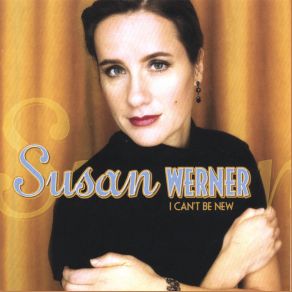I Can't Be New
Download links and information about I Can't Be New by Susan Werner. This album was released in 2004 and it belongs to Jazz, Crossover Jazz, Vocal Jazz, Rock, Pop, Songwriter/Lyricist, Contemporary Folk genres. It contains 13 tracks with total duration of 40:09 minutes.

|
|
|---|---|
| Artist: | Susan Werner |
| Release date: | 2004 |
| Genre: | Jazz, Crossover Jazz, Vocal Jazz, Rock, Pop, Songwriter/Lyricist, Contemporary Folk |
| Tracks: | 13 |
| Duration: | 40:09 |
| Buy it NOW at: | |
| Buy on iTunes $9.99 | |
| Buy on Amazon $8.99 | |
Tracks
[Edit]| No. | Title | Length |
|---|---|---|
| 1. | I Can't Be New | 2:54 |
| 2. | Late for the Dance | 3:36 |
| 3. | Seeing You Again | 2:41 |
| 4. | I'm Not Sure | 4:15 |
| 5. | Much At All | 4:08 |
| 6. | Tall Drink of Water | 3:01 |
| 7. | You Come Through | 3:13 |
| 8. | No One Needs to Know | 2:58 |
| 9. | Let's Regret This In Advance | 2:45 |
| 10. | Don't I Know You | 3:05 |
| 11. | Philanthropy | 2:53 |
| 12. | Stay On Your Side of Town | 2:54 |
| 13. | Coda: Maybe If I Sang Cole Porter | 1:46 |
Details
[Edit]Susan Werner's Koch debut, and her sixth outing overall, is a collection of self-penned tunes in the manner, spirit, and flavor that spending a late night working in an office on Tin Pan Alley might provide. There is a beautiful, smoky, jazzy feeling that reminds one simultaneously of Hoagy Carmichael's more laid-back moments, Jerome Kern's humor, and the deep nostalgic atmospherics of Tom Waits' early Tin Pan Alley-influenced material — without the barfly surrealism. That said, Werner's latest is a thoroughly modern recording. From the opening piano shimmers of the title track, which opens the disc, she comes out with it straightaway — "Coffee, ham and eggs/I can be your dinner" — and seemingly throws all notions of modern-day PC lyric acceptability to the wind, thank god. Werner's lyric sensibility keeps its wit and never gives up the dignity of her protagonist as she states in a matter of fact way that she can be all things but new. It's a beautiful line in the sand that listeners don't hear much anymore in American song. This isn't defiance; it's simply acceptance and a humorous but profound truth. All the best pop songs have them. This album is full of them.
On "Late for the Dance," a bowed bass and clarinet accompany her piano and vocal as she offers a tale of love's regret that is full of whimsy and pondering of what might have been. The full-fledged swing of "Seeing You Again" — complete with the effect of a scratchy 78-rpm record under the opening vocal for effect — erases time and space considerations and instead iterates the song as a finely crafted work that situates the listener in a place of ease and empathy. But these three cuts offer just a glimpse through the window of the completely contemporary setting of "I'm Not Sure," with its smoky, sultry flamenco-styled guitar, string quartet, solo cello, mandolin, and shadowy hand percussion negotiating the terrain between the blues, fado, and sultry bossa nova. Likewise, "No One Needs to Know," where Werner is accompanied only by her guitar and Eugene Friesen's cello, is a torch ballad whispered in the stillness of a love furtively begun and acceded to. In its secret lies its possibility. The finger-popping standup bass and jazzed-up "doo wee" choruses in "Philanthropy," with Dave Mattacks' hand percussion, invert the entire Tin Pan Alley instrumental dictum by stripping everything to the barest notion of song itself — and what a song. This 13-song set closes with that same 78 lisping in the background as Werner's voice comes across the void singing a husky, brazen love song that offers up her shortcomings as possibilities for gaining the other's devotion; yet they are always in the realm of "maybe if I did," not "if I do." She's accepting her protagonist for who she is, and it's enough for the truth of the song; whatever the desired other wants is immaterial. The piano may not quite assent to her vocal in its wistful shapes and dulcet tonal wishes, but the singer's merely nodding to it in the corner of an empty room, singing and playing into the night, out of that same office on Tin Pan Alley. The cycle is complete, the tunes have been written, and it's time to go home.
This is a brilliantly constructed, soulful, and cleverly tender effort by a songwriter and musician who is in such complete command of her gifts that it's almost scary. In a sense it's fair to say that listeners should forget everything they know of Susan Werner and encounter her now, in the fully present articulation of her considerable gifts.